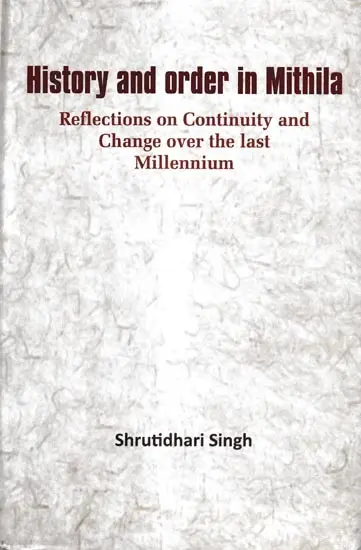
| Express Shipping: Guaranteed Dispatch in 24 hours |
|
| Item Code: | HAP782 |
| Author: | Shrutidhari Singh |
| Publisher: | Mithila Sanskrit Research Institute, Bihar |
| Language: | English |
| Edition: | 2013 |
| ISBN: | 8189832174 |
| Pages: | 208 |
| Cover: | HARDCOVER |
| Other Details | 10.00x 6.5 inch |
| Weight | 440 gm |
The Book explores a thousand years of history of Mithila in order to find the Linkages of ideas, culture, events and their impact on the life of the people of Mithila. Understanding the matrix of continuity and change in Mithila during this period has been the focal point of this investigation.
Dr. Shrutidhari Singh, Associate Professor of Political Science, has successfully performed teaching and research in various disciplines of social Sciences during the last three decades. He worked for his Ph.D. at the Centre for the Study of Developing Societies, Delhi. Has studied the philosophy of grammar and investigated into the area of Social Linguistics as an Associate Fellow at the Institute of Advanced Study, Shimla. Dr. Singh has taught and written on several issues related to the History of Ideas, Philosophy of Language, Sociological History and Political Sciences. He is also a contributor to the Encyclopedia of Music. Dr. Singh has been working at the Post Graduate Department of Political Science at Ramkrishna College, Madhubani since 1982.
The regional history of Mithila has been one of the least preferred areas of exploration in spite of a pressing need for this. It is an area where archaeologists have seldom chosen to work and historians have been unable to prepare a 'consensus canvas' on the chronological history of society. It is true that ever since Mithila was referred to in the Brilhad Vishnupurana and Satpath brahmana events and anecdotes regarding Mithila kept on recurring in different texts. It was only in the 15th century that Mm. Vidyapati Thakur, through his Puruşı-parīksā, kīrtilata and kirtipataka, added a new dimension to the traditional practice inasmuch as he categorically stated that 'values' and 'episteme' of the by-gone ages have little relevance for understanding and explaining social phenomena of the 'present age'. He also seems to insist that what is relevant for understanding and explaining social phenomena is the knowledge of the values and practices extending over a fairly longer past, may be several millennia. He, accordingly, preferred to cite examples (to substantiate his theory) from 'Kaliyuga'. Moving beyond this, Vidyapati confined his narrative in kīrtilata and kīrtipatākā around heroes with whom he spent his time and observed the state of affairs himself. He also made the experiment of accommodating Persian words within Sanskrit syntax, perhaps in order to facilitate the intelligibility and appreciation of his work among the scholars of Persian. Vidyapati's suggestion of taking into consideration the minimum desirable length of the past as necessary for the purpose of understanding the present was indeed very significant; but unfortunately it did not attract the attention of other scholars of his time. A part of his methodology was, however, adopted by Mm. Mahesh Thakur in his Sarvadeśavritäntasamgralia (mid 16th century). Cues to this 'Maithila style of historiography' still could not attract the fancy and favour of scholars at large. In the 17th century, we, therefore, find some stray events narrated through the pieces of Sanskrit literature. The 18th century witnessed the chronicling of wars fought by the Khandawale rulers by more than one chronicler (like Gopal Jha and Lal Kavi) in prose as well as in poetry. Lochan's rägtarangini reflected the aesthetic inclinations of the rulers at that time.
Send as free online greeting card
